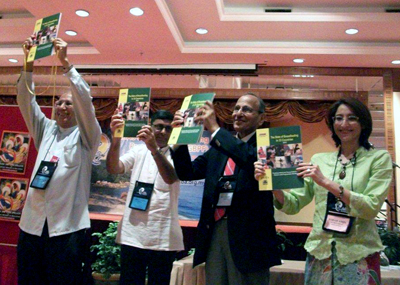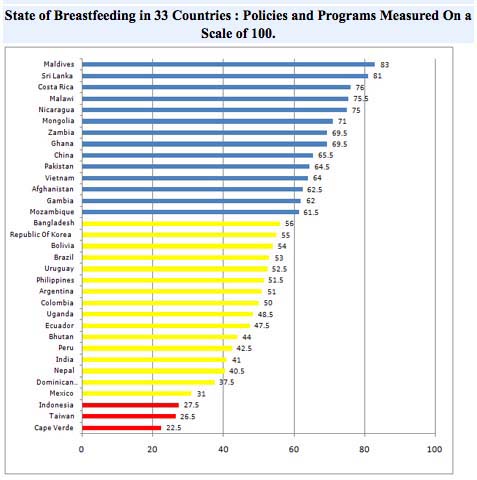World Breastfeeding Trends
Despite progress 42 million infants are sub-optimally fed
As a Global Advocacy Task Force Coordinator, we joined the World Alliance for Breastfeeding Action (WABA) Global Partners Forum in Penang, Malaysia in October where an important new report (and website) was launched by IBFAN Asia.

From the left: Anwar Fazal, Dr Arun Gupta, Dr Raj Anand and Sarah Amin celebrate the release of IBFAN’s WBTi Report at the WABA Conference in Penang, October 2010.
The WBTi State of Breastfeeding in 33 Countries: 2010, Tracking Infant and Young Child Feeding Polices and Programmes Worldwide is packed with useful charts which highlight gaps in policy which lead to babies missing out on their foundation for development and protection from disease. Printed copies are available in Baby Milk Action's on-line Virtual Shop.
Millions of newborns in the 3 continents studied (so far only developing countries) are still not receiving any breastmilk at all and fewer still are breastfed for six months of life.
The ten areas of action highlighted in the Global Strategy for Infant and Young Child Feeding are used to score the policies and programmes of 33 countries RED (worst) YELLOW, BLUE or GREEN (best).

Although much progress has been made, NO country has yet achieved a GREEN rating and only 9 received a BLUE rating. Most have not raised exclusive breastfeeding rates because of weak or un-coordinated action on three of the most important interventions: having a national plan of action with a budget; good health care support facilities and adequate maternity protection. Bridging these gaps could help achieve one of the aims of the UN Secretary General’s new Global Strategy for Women’s and Children’s Health, that 21.9 million more infants are exclusively breastfed for first six months by 2015. It would also contribute towards the UN’s Countdown to 2015, Maternal Newborn and Child Survival Report.
Dr Arun Gupta, the creator of WBTi and IBFAN’s Regional Coordinator for Asia explains:
“What does this mean? Over 78 million babies are born in the 33 countries featured in the report - more than half of the babies born in the world. Yet only about 36 million of these are exclusively breastfed for the first six months. Over 42 million children are still sub-optimally fed. If you look at the booming economy block of Brazil, India, China - despite their progress and the important steps taken to protect health - there are key gaps which mean that infants and children are losing out on the benefits. It’s vital that policy makers ensure that the drive to expand economies does not take precedence over the health of children.”
World Breastfeeding Trends Initiative (WBTi) is part of the IBFAN/WABA Breastfeeding Initiative for Child Survival (gBICS).






